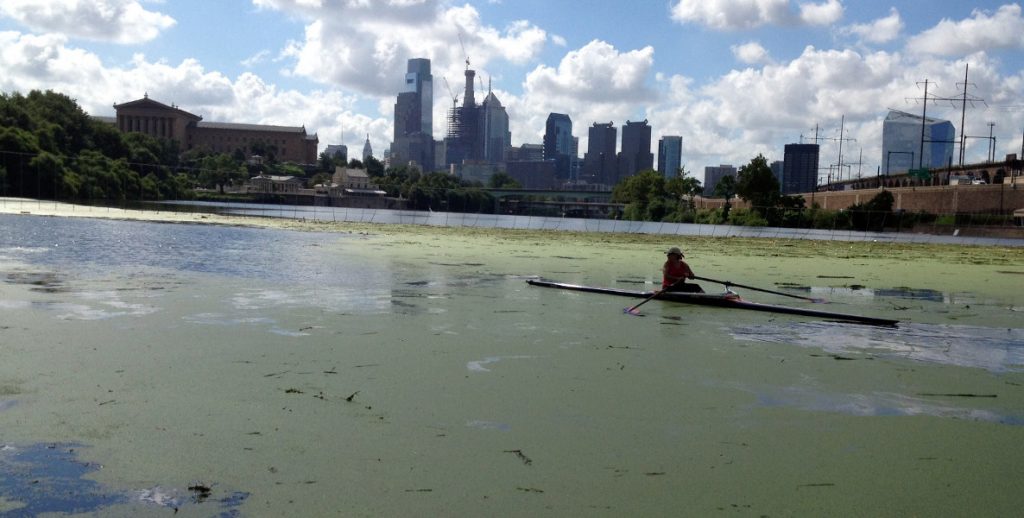Philadelphia is a city of two rivers. But it is defined in many ways, by just one: The Schuylkill, much misspelled, but much venerated. To rowers, commemorated in some of our most storied artworks, it’s a playing field. To the rest of us, it’s a snapshot of the way we view the city at any moment, from the perennially-renewed lights on Boathouse Row, to long sweeping sights of the city’s changing skyline, to the traffic that snakes beside it, to its newest appendage, the celebrated Schuylkill River Trail. It’s hard to imagine the city without its thriving Schuylkill River running through it.
But that river is struggling. This year, for the first time in about a decade, an influx of weeds is starting to strangle the Schuylkill, encroaching on the regatta race course and on the rowing lanes of pleasure boaters. It is also becoming so shallow in spots, because of a regular buildup of silt on the river floor, that it threatens to moor the boathouses all together.
Part of what’s needed is an act of nature: A major storm would raise the river, make it flow faster and lower the temperature, which would help flush out the weeds. But the Schuylkill also needs to be dredged, something the Army Corps of Engineers does every 15 to 20 years. (The last time was in 2000.) It takes an act of Congress to authorize Army Corps projects, and Congressman Bob Brady pledged this summer to make it happen. But it still could be years before the equipment is freed up, and the Schuylkill makes it to the top of the list of Corps projects.
Meanwhile, it’s rowers and paddlers who are keeping the river afloat (as it were). Every morning and every evening for the last several weeks, volunteers from the Schuylkill Navy—which runs Boathouse Row—have spent three hours yanking out weeds, pulling out logs and freeing up the rowing lanes on the river. They are doing it for the sake of their sport—but also, for the sake of their river, Philadelphia’s river.
“A lot of people in the city don’t recognize that the rowing community for 150 years has been the primary steward of the Schuylkill River,” says Bonnie Mueller, secretary of the Schuylkill Navy, the oldest amateur sporting organization in the country, run entirely by volunteers. “Everything that happens here, rowers take care of. Everyone loves the Schuylkill, and Boathouse Row. That will all go away if this isn’t taken care of.”
Volunteers set out from Fairmount Boat Club to weed the river last Friday evening. High water temperatures, along with shallow and slow-moving water have led to two types of growth on the surface of the river: milfoil, a non-native invasive species that grows from the river floor; and duck weed, a surface growth that traps logs and debris. Mueller says an explosion of weeds like this hasn’t occurred since around 1999.
Al Wachlin, a retired rower from Fairmount Boat Club, steers his barge, a raft-like boat he assembled to help the Schuylkill Navy set up race courses for its regattas. For cleanups, Wachlin attaches a cutter that mows down the weeds, or a chain that yanks them out of the ground. Behind him, Mary Ann Case, a rower from Penn AC, and Monica Bersani, of Fairmount Boat Club, grab the weeds and pull them on to the barge.
Volunteer Patrick Hoeppner, grabbing weeds from the back of Wachlin’s mower barge. Some 80 rowers volunteer every week to weed the river, in groups of five, for three hours every morning and evening. “The river is our home, and we recognize that we do our sport on a river in the middle of a large city and the middle of Fairmount Park, and we have a sense of stewardship around it,” says Mueller. Anyone is welcome to join the effort to keep the river weed-free.
Audrey Squire, a rower at Vesper Boat Club, grabs a handful of weeds on Thursday night, near one of the areas where weeds are the worst—by the boathouses; near Peter’s Island, where the racing finish line sits; and on the west bank of the course itself. “Boathouse Row is becoming landlocked,” says Mueller. “Pretty soon, there won’t be any boat houses there at all.”
Rowers are able to move through the duckweed on the river surface, but it traps logs and other debris that can hit oars and stop boats. Volunteers take turns pulling them out of the water and throwing them on to the raft. Parks & Rec sends crews every morning to carry away the river rubbish that volunteers pile up on shore.
Weeds pile up on Wachlin’s boat, where he always travels with his dog, Miss Pippins. Last week, the Philadelphia Water Department also asked Wachlin to help clear vegetation from the intakes that supply the city’s drinking water. “This isn’t just something that affects rowers,” Mueller notes. “People who have nothing to do with rowing like the Schuylkill and what happens there, but don’t realize how much effort goes into maintaining it.”
By the end of every night, volunteers—including Tory Mathers, Case and Squire—remove a three to four foot pile of weeds, still a fraction of what is growing on the river. The weeds will hopefully subside with colder weather in the fall and winter. But the sediment on the riverbed will keep accumulating until the Army Corps dredges, something that will reportedly cost around $3 million. Meanwhile, the estimated annual revenue from regattas, according to the Schuylkill Navy: $50 million.
Text by Roxanne Patel Shepelavy.
Know someone who’s working to make the city better without waiting for government to step in and help? Suggest them as a Citizen of the Week.

